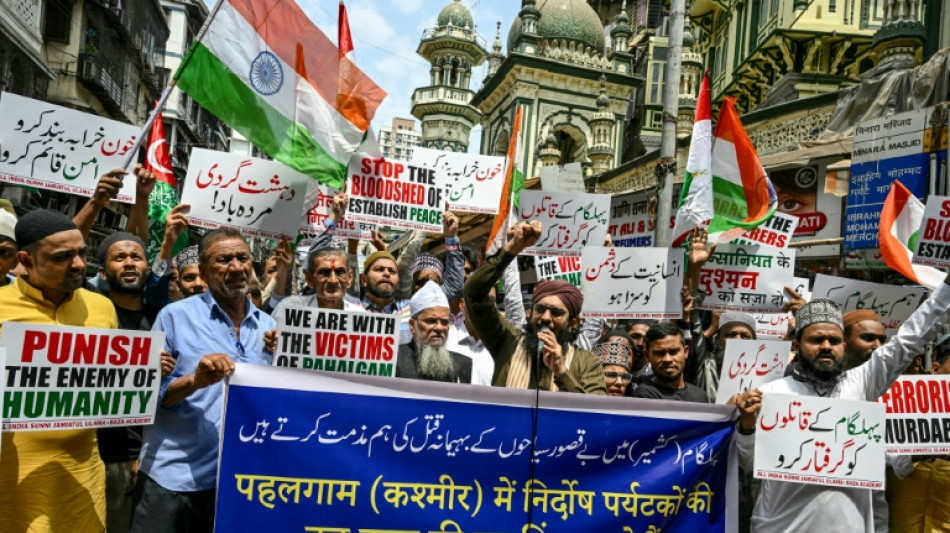

Pakistan says open to neutral probe into Kashmir attack after India threats
Pakistan's leader said his nation was open to a neutral investigation on Saturday into a deadly attack in Indian-run Kashmir that New Delhi blames on Islamabad, and that has sent fraught relations into a tailspin with soldiers exchanging gunfire across their contested frontier.
Islamabad denies involvement in the April 22 attack on tourists in Pahalgam, where a gang of gunmen killed 26 men in the worst attack on civilians in Kashmir for a quarter of a century.
But India is adamant in it is accusation that Pakistan is supporting "cross-border terrorism".
Indian police have issued wanted posters for three men -- two Pakistanis and an Indian -- who they say are members of the Pakistan-based Lashkar-e-Taiba group, a UN-designated terrorist organisation.
Rejecting Indian claims, Pakistan's Prime Minister Shehbaz Sharif on Saturday said the country was "open to participating in any neutral, transparent and credible investigation" into the attack.
Indian security forces have launched a giant manhunt for those responsible for the attack in Pahalgam, blowing up homes in Kashmir of Indian citizens suspected to be linked to the attack.
Both sides have imposed a slew of diplomatic measures, and exchanged gunfire in Kashmir two times in as many days.
India's army said "unprovoked" small arms firing was carried out by "multiple" Pakistan army posts overnight.
"Indian troops responded appropriately with small arms," it said in a statement, adding that no casualties were reported.
There was no confirmation from Pakistan, but both sides had confirmed gunfire between their respective forces the previous night.
"Our valiant armed forces remain fully capable and prepared to defend the country's sovereignty," Sharif said at a military ceremony in Abbottabad.
Inda's information ministry on Saturday warned broadcasters to "refrain from showing live coverage of defence operations" in the "interest of national security", and referencing the 1999 Kargil conflict with Pakistan.
The United Nations has urged the neighbours, which have fought multiple wars, to show "maximum restraint".
Iran's foreign ministry said Saturday that Tehran has offered to play mediator, a day after a senior Saudi official said Riyadh was trying to "prevent an escalation".
US President Donald Trump has downplayed the tensions, saying that the dispute will get "figured out, one way or another".
- Divided for decades -
Kashmir has been divided between India and Pakistan since their independence in 1947. Both claim the territory in full but govern separate portions of it.
Rebel groups have waged an insurgency in Indian-controlled Kashmir since 1989, demanding independence or a merger with Pakistan.
A day after the attack, New Delhi suspended a water-sharing treaty, announced the closure of the main land border crossing with Pakistan, downgraded diplomatic ties and withdrew visas for Pakistanis.
Islamabad in response ordered the expulsion of Indian diplomats and military advisers, cancelled visas for Indian nationals -- with the exception of Sikh pilgrims -- and closed the main border crossing from its side.
Pakistan also warned that any attempt by India to stop water supplies from the Indus River would be an "act of war".
At the frontier, created at the end of British rule when the sub-continent was partitioned into Hindu-majority India and Muslim-majority Pakistan, distraught citizens crossed.
The measures have abruptly ended rare visits to see relatives separated for generations by the border.
Vikram Udasi, an Indian doctor, said his family was "caught in the middle" with his Pakistani wife and their child stuck on the other side of the Attari-Wagah border crossing.
"Please allow them to return. Go ahead, cancel tourist and other short-term visas, but let those with families and long-term visas return, please," begged the 37-year-old.
Pahalgam marks a dramatic shift in recent Kashmiri rebel attacks, which typically target Indian security forces.
Experts say that an Indian military response may still be in the pipeline.
In 2019, a suicide attack killed 41 Indian troops in Kashmir and triggered Indian air strikes inside Pakistan, bringing the countries to the brink of all-out war.
P.Braun--LiLuX



